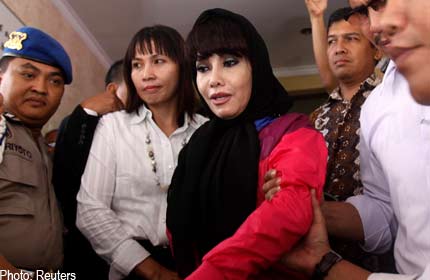Two Indonesian women, Selly Yustiawati and Melinda Dee are making headlines in the Indonesian press for their alleged involvement in a scam across several cities in the country involving millions of rupiah. One of the women, Inong Melinda, 47 who went by the alias of Melinda Dee, is a former Senior Manager at Citibank.

While this story already has the makings of a daytime telenovela the Indonesian press added their own dramatic flair with their sexist sensationalizing of the two prime suspects, labeled by the media as “femme fatales” and “pretty deceivers”:
…Terms such as “beautiful”, “pretty” and “sexy” are often used to describe women who become criminal suspects. Sexist language and gender-biased media may best describe how the Indonesian media portrays women. In the case of Selly and Malinda, the media tends to have presented facts about crimes that are based more on the sex of the offenders than the crime itself.
The article points out that instead of feeding the public useless details on “the physical appearance of offenders,” the media should use the opportunity to educate people about safeguarding their credit card information.
The Jakarta Post states that this case demonstrates how the media helps to “strengthen cultural-misogynist notion of ‘liberated’ women’ “, selling the crimes Selly and Melinda committed as a warning to society of what happens when women venture from their designated domestic sphere.
The Post stipulates that because the same portrayal is not applied to male criminals, female criminals end up being punished more severely.
I just thought it was so ironic and hypocritical to stumble upon this story days after another woman in Indonesia made the headlines.
Irdayanti Mukhtar is a 34-year-old Indonesian woman who was caned last week for adultery outside a mosque in Jantho, Indonesia. She received nine-lashes and collapsed before being taken to the hospital. Reportedly Mukhtar was molested by the crowd as she walked up to her caning.
What I find so enraging in both these stories is where are the punishments for the men involved? Why was Mukhtar punished for her crime but not the man she allegedly had the affair with? Why are women being sexualized in the press for crimes to sell papers, but at the same time being sexual? Can you imagine if a man was publicly flogged every time he had an extra-marital affair?
Women not only receive harsher punishments for offenses men also commit, but apparently the ultimate crime is when women break social norms which objectify them while suppressing their sexuality.
*This post of mine was first published on Forbes Woman.
The worst crime is murder. Much of the rest, even fraud and robbery, is reversible over time. I wonder if every person knows about self if he (or she) is capable of killing? Or what is the deepest reason a person wouldn’t actually go and kill someone? Is it some sort of a pledge?